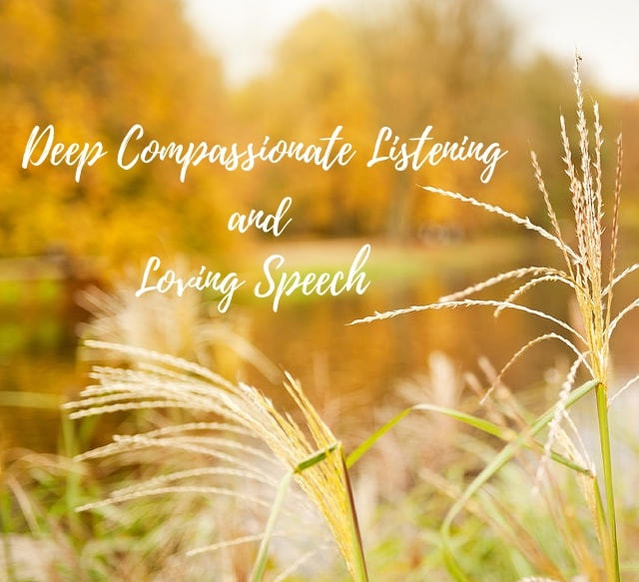What comes to mind when you think of loving speech? For me it brings to mind open communication filled with compassion and love, lacking in judgment or advice giving.
In an interview with Oprah, Thich Nhat Hanh, a Buddhist monk and peace activist, discussed the concepts of deep compassionate listening and loving speech. He believes that deep listening, or compassionate listening, can help relieve the suffering of another person and that loving speech in-conjunction with deep compassionate listening allows for the type of communication that will resolve conflict and shift perceptions.
Thich Nhat Hanh describes deep compassionate listening like this:
"You listen with only one purpose, help him or her to empty his heart. And if you remember that you are helping him or her to suffer less, and then even if what he says is full of wrong perceptions, full of bitterness, you are still capable to continue to listen with compassion. Because you know that listening like that, with compassion, you give him or her a chance to suffer less. If you want to help him or her to correct his perception, then you wait for another time. But for the time being, you just listen with compassion and help him or her to suffer less. One hour like that can bring transformation and healing. The fear, the anger and the despair is born on the ground of wrong perception. We have wrong perceptions concerning ourselves and the other person, and that is the foundation for conflict, war and violence."
Thich Nhat Hanh describes loving speech like this:
"The only way we can begin to end conflict is communication between people. We should be able to say like this: 'dear friends, dear people, I know that you suffer a lot. I have not understood enough of your difficulties and suffering. It's not our intention to make you suffer more. It is opposite. So please tell us about your suffering, your difficulties. I'm eager to learn, to understand.' It has to start like that, loving speech. And if you are honest, if you are true, they will open their heart and tell us. And then we practice compassionate, deep listening. And during the process of deep listening, we can learn so much about our own perceptions and their perceptions."
Deep listening and loving speech to end conflict within our personal relationships, professional relationships and global relations.
Deep compassionate listening is to listen with your ears, eyes and heart. To pay attention to body language, to tone of voice, to the hidden emotions behind what is being said. To be fully present. Making someone feel that they are truly listened to, seen and heard.
Most of us typically practice what's considered to be negative listening habits. Here are six negative listening habits (taken from Priceless Professional Development). Do you see yourself in any of them?
1. The Faker: All the outward signs are there: nodding, making eye contact giving the occasional uh-huh. However, the faker isn’t concentrating on the speaker. His mind is elsewhere. He or she is pretending to listen.
2. The Interrupter: The interrupter doesn’t allow the speaker to finish and doesn’t ask clarifying questions or seek more information from the speaker. He’s too anxious to speak his words than to listen.
3. The Thief: The thief uses the speaker’s words only as a way to get to his message across. When the speaker says something, the thief steals the focus and then changes to his own point of view, opinion, story or facts. Favorite thief lines are, “Oh that’s nothing, here’s what happened to me...”, “ I remember when I was…”
4. The Advice Giver: Giving advice is sometimes helpful; however, at other times, this behavior interferes with good listening, because it does not allow the speaker to fully articulate his feelings or thoughts; it doesn’t help the speaker solve his own problems; it prohibits venting; it could also belittle the speaker by minimizing a concern with a quick solution. Well-placed advice is an important function in selling and leading. However, advice given too quickly, and at the wrong time, is a turnoff to the speaker.
5. The Rebuttal-Maker: This listener only listens long enough to form a rebuttal. His point is to use the speaker’s words against him. At his worst, he is argumentative and wants to prove you wrong. At the least, this person always wants to make the speaker see his point of view.
6. The Intellectual or Logical Listener: This person is always trying to interpret what the speaker is saying and why. He’s judging the speaker’s words and trying to fit them into his logic box. He rarely asks about the underlying feeling or emotion attached to a message.
When practicing deep compassionate listening we are practicing positive listening skills, not these type of negative listening habits. Deep compassionate listening says I'm here for you, I'm in it with you, I'm not here to fix you or to judge you, I'm here to feel with you and to let you know that you are not alone.
What might our relationships, and the world overall, look like if we each practiced deep compassionate listening and loving speech?

 RSS Feed
RSS Feed
